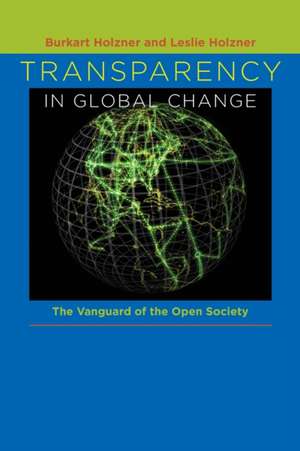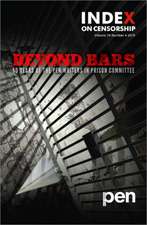Transparency in Global Change: The Vanguard of the Open Society
Autor Burkart Holzner, Leslie Holzneren Limba Engleză Paperback – 27 mar 2006
Transparency in Global Change examines the quest for information exchange in an increasingly international, open society. Recent transformations in governments and cultures have brought about a surge in the pursuit of knowledge in areas of law, trade, professions, investment, education, and medical practice—among others. Technological advancements in communications, led by the United States, and public access to information fuel the phenomenon of transparency. This rise in transparency parallels a diminution of secrecy—though, as Burkart and Leslie Holzner point out, secrecy continues to exist on many levels. Based on current events and historical references in literature and the social sciences, <I>Transparency in Global Change</I> focuses on the turning points of information cultures, such as scandals, that lead to pressure for transparency. Moreover, the Holzners illuminate byproducts of transparency—debate, insight, and impetus for change, as transparency exposes the moral corruptions of dictatorship, empire, and inequity.
Preț: 457.00 lei
Nou
Puncte Express: 686
Preț estimativ în valută:
87.52€ • 90.17$ • 73.32£
87.52€ • 90.17$ • 73.32£
Carte tipărită la comandă
Livrare economică 22 februarie-08 martie
Preluare comenzi: 021 569.72.76
Specificații
ISBN-13: 9780822958956
ISBN-10: 0822958953
Pagini: 397
Dimensiuni: 156 x 230 x 25 mm
Greutate: 0.55 kg
Ediția:1
Editura: University of Pittsburgh Press
Colecția University of Pittsburgh Press
ISBN-10: 0822958953
Pagini: 397
Dimensiuni: 156 x 230 x 25 mm
Greutate: 0.55 kg
Ediția:1
Editura: University of Pittsburgh Press
Colecția University of Pittsburgh Press
Recenzii
"Likely to become an important future reference on discussions of governance and globalization."
--Contemporary Sociology
--Contemporary Sociology
“Transparency in Global Change offers an ambitious discussion of the value of transparency in societies undergoing processes of global change. Focusing on a broad range of nations across the world, and relying on a rich analysis of historical as well as contemporary developments, the authors deliver a powerful and provocative contribution to the study of globalization and the value of open societies. Exceedingly well written, this book will be useful to students and scholars interested in globalization, international studies, and public policy.”
—Mathieu Deflem, University of South Carolina
—Mathieu Deflem, University of South Carolina
“Transparency in Global Change offers a rare educational experience of critical aspects of advanced modernity. Burkart and Leslie Holzner judiciously analyze our contemporary post–cold war, post 9/11 global situation as pitting the democratic ideal of the ‘open society,’ based on trust and citizen engagement, against resistance to accountability and transparency from power structures favoring secrecy. The sweep of their work is not only enormous, covering the private and public sectors, but it is also balanced, since some degree of secrecy is a fact of social life, as Simmel long ago realized. All those interested in questions of governance in the global information age will benefit from reading this work. And hopefully they will be stimulated to become active agents for the ‘open society.’”
—Edward A. Tiryakian, Duke University
—Edward A. Tiryakian, Duke University
Notă biografică
Burkart Holzner is professor of sociology and public and international affairs, and Distinguished Service Professor Emeritus of International Studies at the University of Pittsburgh. His earlier work dealt with the sociology of knowledge and includes Reality Construction in Society, and (with John Marx) Knowledge Application: The Knowledge System in Society. He directed the University Center for International Studies for twenty years and became increasingly interested in global change.
Leslie Holzner, a sociologist, was assistant director at the Learning Research and Development Center, University of Pittsburgh. She has written about organizational change, educational reform, and especially restructuring of mathematics education.
Leslie Holzner, a sociologist, was assistant director at the Learning Research and Development Center, University of Pittsburgh. She has written about organizational change, educational reform, and especially restructuring of mathematics education.
Descriere
An examination of the quest for information exchange in an increasingly international, open society, Transparency in Global Change discusses the reasons for the recent increase in public desire for transparency and the byproducts this transparency can produce.













